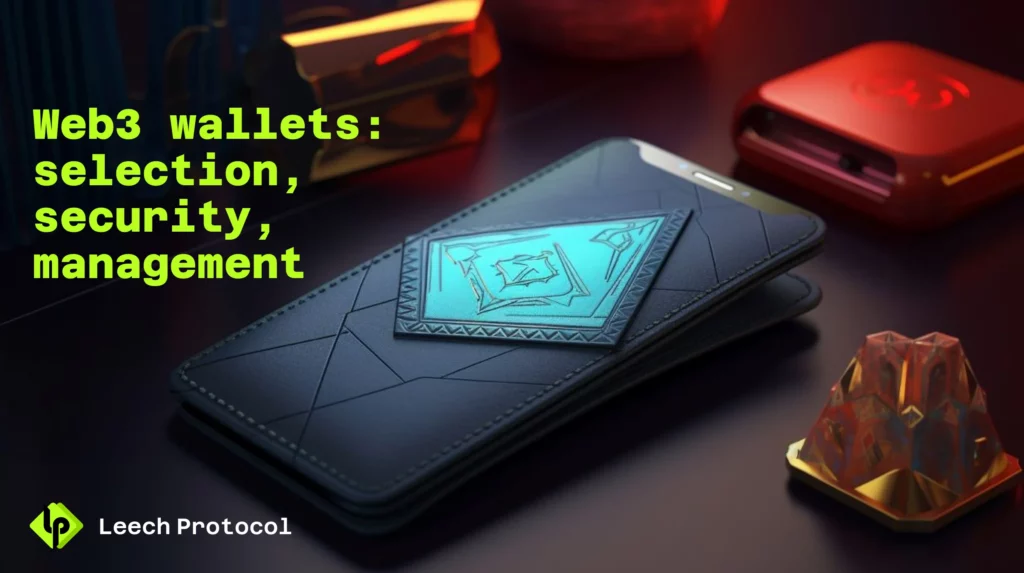Yield Farming Academy #1 Crypto Wallets
Home | News & Insights Yield Farming Academy #1 Crypto Wallets This is the first lecture in the Yield Farming Academy section from the Leech Protocol. The path of any crypto enthusiast begins with the creation of a wallet. In this lecture we will tell you all about wallets and even more. Sit down comfortably, make yourself a cup of tea and we’ll start our tech journey! Table of Content What is Crypto Wallet and how it works? A cryptocurrency wallet is like a digital safe that allows you to store, manage, and use your cryptocurrencies securely. It’s a tool that helps you interact with the exciting world of digital assets safely and conveniently. When you create a cryptocurrency wallet, you create a unique digital identity for yourself. It’s like having your own virtual bank account but with the benefit of complete control and privacy. A critical aspect of a cryptocurrency wallet is the creation of your private and public keys. The private key is a confidential piece of information that only you should know. It’s like your secret password to unlock your wallet and make transactions. The public key, on the other hand, is like your public address. It’s what you share with others to receive funds. What is Crypto Wallet and how it works? Using a cryptocurrency wallet is as easy as using any other digital tool. Once you’ve set up your wallet, you can check your balances, send funds to others or receive funds. When you initiate a transaction, your wallet digitally signs it with your private key to prove that you’re the rightful owner of the funds. This signature is then broadcasted to the blockchain network, where it gets verified and added to the decentralized ledger. This way, you can be confident that your transactions are secure and transparent. In addition, it’s impossible to reveal your private key from the signature. It’s important to note that different types of cryptocurrency wallets are available on the market. Some wallets are custodial, meaning they are provided by third-party services that manage your private keys on your behalf. Others are non-custodial, which means you have complete control over your keys and funds. Another critical point in understanding how wallets work is that your assets are not stored in a wallet, they are stored on a blockchain, and the wallet allows you to manage them. With the right cryptocurrency wallet, you can dive into the exciting world of digital currencies and decentralized finance with confidence and peace of mind. Safely store your funds, manage your transactions, and explore the endless possibilities of crypto and the DeFi world. We created this session of Yield Farming Academy to describe all the essential aspects of crypto wallets. Please read it carefully and check our tutorial at the end. Also, we prepared some quests & tasks for you to prove your knowledge. The Evolution of Crypto Wallets The Evolution of Crypto Wallets Crypto wallets have come a long way to cater the evolving needs of users and enhance security measures. Let’s explore the notable developments in the evolution of crypto wallets: By embracing these advancements, crypto wallets have evolved into sophisticated tools that empower users to securely store, manage, and transact with their digital assets. Ultimately, choosing a cryptocurrency wallet depends on your needs and preferences. Consider security features, user-friendliness, compatibility with cryptocurrencies, DeFi interaction and backup options. Researching and selecting a reputable wallet that aligns with your requirements is always better than trusting someone’s opinion. Custodial and non-custodial wallets Custodial and non-custodial wallets are two different types of cryptocurrency wallets that differ in terms of control and custody of private keys. Custodial and non-custodial wallets Custodial Wallets: Custodial wallets, also known as hosted wallets or third-party wallets, are wallets where the private keys of the users’ cryptocurrency holdings are held and managed by a third-party service provider. In this type of wallet, users rely on the custodian to safeguard their private keys and manage their funds. Examples of custodial wallets include wallets provided by cryptocurrency exchanges like Coinbase, Binance, or Kraken. Pros of Custodial Wallets: Cons of Custodial Wallets: Non-Custodial Wallets: Non-custodial wallets, also known as self-custody wallets or user-controlled wallets, are wallets where users have full control over their private keys. In this type of wallet, users generate and store their private keys locally on their devices or in a secure offline environment. Non-custodial wallets do not rely on any third-party service provider to manage the private keys or access the funds. Examples of non-custodial wallets include software wallets like Electrum, MetaMask, and Argent, or hardware wallets. Pros of Non-Custodial Wallets: Cons of Non-Custodial Wallets: When choosing between custodial and non-custodial wallets, users should consider factors such as security, control, privacy, and their own level of expertise in managing cryptocurrency wallets. In our industry, we have amazing Quote. Not Your Keys, Not Your Coins! It is essential to weigh the trade-offs and choose the option that aligns with their preferences and requirements. We recommend using non-custodial wallets for most of the crypto portfolio. The public key & wallet address and private key & seed phrase Let’s dive into more technical aspects of the relationship between the public key & wallet address and private key & seed phrase: The public key & wallet address and private key & seed phrase Public Key: The public key is a publicly shared cryptographic key for encryption and verification. It is derived from the private key using a mathematical algorithm. Public keys are required to encrypt data or verify the authenticity of digital signatures. They are accessible to others without compromising the security of the encryption process. For example, when someone wants to send you an encrypted message, they use your public key to encrypt it. Only you, as the holder of the corresponding private key, can decrypt and access the message. Wallet Address: A wallet address is a unique identifier used in cryptocurrencies to receive funds. It is a string of alphanumeric characters, such as a Bitcoin or Ethereum address. When you want someone to

